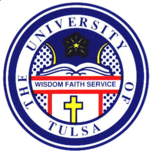The University of Tulsa
 |
|
|
Former names
|
Henry Kendall College (1894–1920) |
|---|---|
| Motto | Wisdom, Faith, Service |
| Type | Private |
| Established | 1894 |
|
Religious affiliation
|
Presbyterian Church |
| Endowment | $957.5 million (2016) |
| President | Gerard Clancy |
|
Academic staff
|
306 (full-time) |
| Students | 4,352 |
| Undergraduates | 3,174 |
| Postgraduates | 1,178 |
| Location | Tulsa, Oklahoma, U.S. |
| Campus | Urban, 230 acres (930,000 m²) |
| Colors | Royal blue, old gold, and crimson |
| Nickname | Golden Hurricane |
|
Sporting affiliations
|
NCAA Division I (FBS) The American |
| Mascot | Captain Cane |
| Website | www |
 |
|
| University rankings | |
|---|---|
| National | |
| Forbes | 175 |
| U.S. News & World Report | 86 |
| Washington Monthly | 292 |
| Global | |
| QS | 701+ |
| Times | 501–600 |
|
USNWR graduate school rankings |
|
|---|---|
| Engineering | 120 |
| Law | 82 |
|
USNWR departmental rankings |
|
|---|---|
| Clinical Psychology | 143 |
| Earth Sciences | 110 |
| English | 67 |
| Psychology | 190 |
| Speech–Language Pathology | 199 |
The University of Tulsa (TU) is a private research university located in Tulsa, Oklahoma, United States. The university is historically affiliated with the Presbyterian Church. The university is renowned for its programs in law, English, computer science, natural sciences, psychology, and engineering. Its faculty includes prominent scholars, scientists, and writers, including Russian dissident poet Yevgeny Yevtushenko, political scientist Robert Donaldson and others. The campus's design is predominantly Collegiate Gothic.
The university manages the Gilcrease Museum, which includes one of the largest collections of American Western art in the world, and in 2016, The Bob Dylan Archive was placed at the university.
TU's athletic teams are collectively known as the Tulsa Golden Hurricane and compete in Division I of the NCAA as members of the American Athletic Conference (The American).
The Presbyterian School for Girls (also known as "Minerva Home") was founded in Muskogee, Indian Territory, in 1882 to offer a primary education to young women of the Creek Nation.
In 1894, the young school expanded to become Henry Kendall College, named in honor of Reverend Henry Kendall, secretary of the Presbyterian Board of Home Missions. The first president was William A. Caldwell, who served a brief, two-year term ending in 1896.
Caldwell was succeeded by William Robert King, a Presbyterian minister and co-founder of the college, who had come to Oklahoma from Tennessee, by way of the Union Theological Seminary in New York City (affiliated with Columbia University). Kendall College, while still in Muskogee, granted the first post-secondary degree in Oklahoma in June 1898. Under King, the college was moved from its original location in downtown Muskogee to a larger campus on lands donated by Creek Nation Chief Pleasant Porter.
...
Wikipedia
